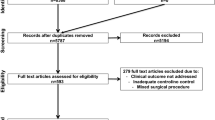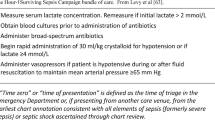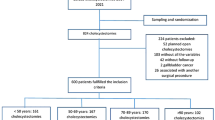Abstract
Purpose
To evaluate the association between intraoperative fluid intake and postoperative complications in patients who underwent radical cystectomy (RC) for bladder cancer with an enhanced recovery protocol.
Methods
287 patients underwent open RC with enhanced recovery protocol (ERAS) from 2012 to 2016. 107 were excluded; non-urothelial (30), palliative (37), had adjunct procedures or not-consented (40). We prospectively evaluated intraoperative fluid intake (crystalloid, colloid and blood) and correlated with length of stay, 30- and 90-day complications.
Results
180 patients enrolled into the study with median age of 70 years (78% male). 71% underwent orthotopic diversion. Median intraoperative crystalloid and colloid intake were 4000 and 500 cc, respectively. Nineteen percent of patients received blood transfusion. Median length of stay was 4 days. The overall 30- and 90-day complication rates were 59 and 75%, respectively. Multivariate logistic regressions controlling for a subset of clinically relevant variables showed no significant association between intraoperative fluid intake and complications at 30 or 90 days (p = 0.88 and 0.62, respectively). A multivariable linear regression similarly showed no association between total intraoperative fluid intake and length of stay (p = 0.099).
Conclusion
Higher intraoperative fluid intake was not found to independently increase the complication rate following radical cystectomy. Larger studies and prospective trials are needed to determine if fluid optimization may play a role in decreasing morbidity after this major surgery.
Similar content being viewed by others
References
Siegel RL, Miller KD, Jemal A (2015) Cancer statistics, 2015. CA Cancer J Clin 65(1):5–29
Kim SP, Shah ND, Karnes RJ, Weight CJ, Frank I, Moriarty JP et al (2012) The implications of hospital acquired adverse events on mortality, length of stay and costs for patients undergoing radical cystectomy for bladder cancer. J Urol 187(6):2011–2017
Shabsigh A, Korets R, Vora KC, Brooks CM, Cronin AM, Savage C et al (2009) Defining early morbidity of radical cystectomy for patients with bladder cancer using a standardized reporting methodology. Eur Urol 55(1):164–174
Sun M, Ravi P, Karakiewicz PI, Sukumar S, Sammon J, Bianchi M et al (2014) Is there a relationship between leapfrog volume thresholds and perioperative outcomes after radical cystectomy? Urol Oncol 32(1):e7–e13
Arumainayagam N, McGrath J, Jefferson KP, Gillatt DA (2008) Introduction of an enhanced recovery protocol for radical cystectomy. BJU Int 101(6):698–701
Daneshmand S, Ahmadi H, Schuckman AK, Mitra AP, Cai J, Miranda G et al (2014) Enhanced recovery protocol after radical cystectomy for bladder cancer. J Urol 192(1):50–55
Brandstrup B, Tonnesen H, Beier-Holgersen R, Hjortso E, Ording H, Lindorff-Larsen K et al (2003) Effects of intravenous fluid restriction on postoperative complications: comparison of two perioperative fluid regimens: a randomized assessor-blinded multicenter trial. Ann Surg 238(5):641–648
Gustafsson UO, Hausel J, Thorell A, Ljungqvist O, Soop M, Nygren J et al (2011) Adherence to the enhanced recovery after surgery protocol and outcomes after colorectal cancer surgery. Arch Surg 146(5):571–577
Wuethrich PY, Burkhard FC, Thalmann GN, Stueber F, Studer UE (2014) Restrictive deferred hydration combined with preemptive norepinephrine infusion during radical cystectomy reduces postoperative complications and hospitalization time: a randomized clinical trial. Anesthesiology 120(2):365–377
Giglio MT, Marucci M, Testini M, Brienza N (2009) Goal-directed haemodynamic therapy and gastrointestinal complications in major surgery: a meta-analysis of randomized controlled trials. Br J Anaesth 103(5):637–646
Delaney CP, Zutshi M, Senagore AJ, Remzi FH, Hammel J, Fazio VW (2003) Prospective, randomized, controlled trial between a pathway of controlled rehabilitation with early ambulation and diet and traditional postoperative care after laparotomy and intestinal resection. Dis Colon Rectum 46(7):851–859
Ren L, Zhu D, Wei Y, Pan X, Liang L, Xu J et al (2012) Enhanced recovery after surgery (ERAS) program attenuates stress and accelerates recovery in patients after radical resection for colorectal cancer: a prospective randomized controlled trial. World J Surg 36(2):407–414
Vlug MS, Wind J, Hollmann MW, Ubbink DT, Cense HA, Engel AF et al (2011) Laparoscopy in combination with fast track multimodal management is the best perioperative strategy in patients undergoing colonic surgery: a randomized clinical trial (LAFA-study). Ann Surg 254(6):868–875
Morgan KA, Lancaster WP, Walters ML, Owczarski SM, Clark CA, McSwain JR et al (2016) Enhanced recovery after surgery protocols are valuable in pancreas surgery patients. J Am Coll Surg 222(4):658–664
Djaladat H, Daneshmand S (2014) Enhanced recovery pathway following radical cystectomy. Curr Opin Urol 24(2):135–139
Tyson MD, Chang SS (2016) Enhanced recovery pathways versus standard care after cystectomy: a meta-analysis of the effect on perioperative outcomes. Eur Urol 70(6):995–1003
Lowell JA, Schifferdecker C, Driscoll DF, Benotti PN, Bistrian BR (1990) Postoperative fluid overload: not a benign problem. Crit Care Med 18(7):728–733
Nisanevich V, Felsenstein I, Almogy G, Weissman C, Einav S, Matot I (2005) Effect of intraoperative fluid management on outcome after intraabdominal surgery. Anesthesiology 103(1):25–32
Holte K, Kehlet H (2006) Fluid therapy and surgical outcomes in elective surgery: a need for reassessment in fast-track surgery. J Am Coll Surg 202(6):971–989
Holte K, Foss NB, Andersen J, Valentiner L, Lund C, Bie P et al (2007) Liberal or restrictive fluid administration in fast-track colonic surgery: a randomized, double-blind study. Br J Anaesth 99(4):500–508
Chappell D, Jacob M, Hofmann-Kiefer K, Conzen P, Rehm M (2008) A rational approach to perioperative fluid management. Anesthesiology 109(4):723–740
Marik PE, Cavallazzi R (2013) Does the central venous pressure predict fluid responsiveness? An updated meta-analysis and a plea for some common sense. Crit Care Med 41(7):1774–1781
Gomez-Izquierdo JC, Feldman LS, Carli F, Baldini G (2015) Meta-analysis of the effect of goal-directed therapy on bowel function after abdominal surgery. Br J Surg 102(6):577–589
Srinivasa S, Lemanu DP, Singh PP, Taylor MH, Hill AG (2013) Systematic review and meta-analysis of oesophageal Doppler-guided fluid management in colorectal surgery. Br J Surg 100(13):1701–1708
Pillai P, McEleavy I, Gaughan M, Snowden C, Nesbitt I, Durkan G et al (2011) A double-blind randomized controlled clinical trial to assess the effect of Doppler optimized intraoperative fluid management on outcome following radical cystectomy. J Urol 186(6):2201–2206
Author information
Authors and Affiliations
Contributions
SB Protocol/project development, Data collection or management, Manuscript writing/editing. SG Protocol/project development, Data collection or management, Data analysis, Manuscript writing/editing. BT Data collection or management. GM Data collection or management, Data analysis. JC Data analysis. SD Protocol/project development, Manuscript writing/editing. HD Protocol/project development, Manuscript writing/editing.
Corresponding author
Ethics declarations
Conflict of interest
The authors declare that they have no competing interests.
Ethical approval
All procedures performed in studies involving human participants were in accordance with the ethical standards of the institutional and/or national research committee and with the 1964 Helsinki declaration and its later amendments or comparable ethical standards.
Informed consent
Informed consent was obtained from all individual participants included in the study.
Rights and permissions
About this article
Cite this article
Bazargani, S.T., Ghodoussipour, S., Tse, B. et al. The association between intraoperative fluid intake and postoperative complications in patients undergoing radical cystectomy with an enhanced recovery protocol. World J Urol 36, 401–407 (2018). https://doi.org/10.1007/s00345-017-2164-8
Received:
Accepted:
Published:
Issue Date:
DOI: https://doi.org/10.1007/s00345-017-2164-8




